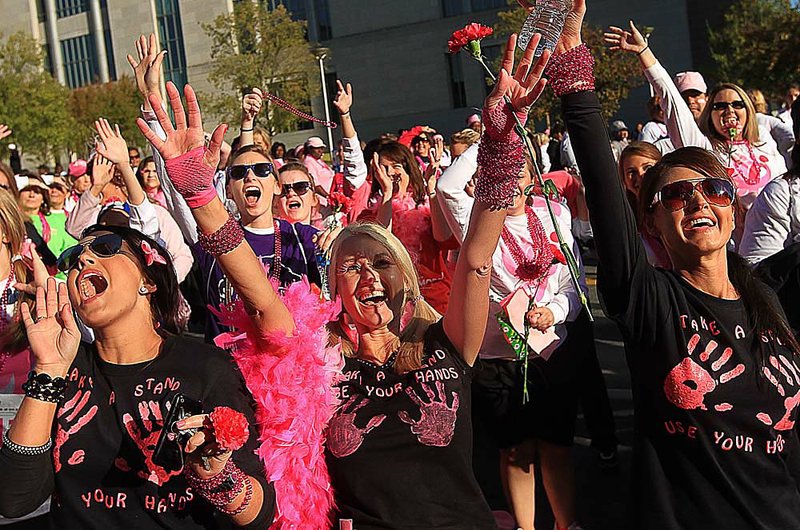LITTLE ROCK — Catcalls and whistles are usually considered rude. But during the annual Susan G. Komen Race for the Cure, it’s the language of love, at least when women are hooting and hollering at the male supporters lining the route of the breast-cancer charity event.
“When you think about what some of these women go through, it’s important that we as men be supportive. We all have mothers, grandmothers, wives, sisters or aunts, we should be supportive,” Little Rock Fire Chief Gregory Summers said as he took a break from dancing atop a firetruck with several other firefighters as they tossed pink Mardi Grasstyle beads to passers-by.
Nearby, Summers’ wife, Jeanette Summers, beamed. She said she has no problem with her husband being objectified for a good cause.
“I love it, I love it, I love it,” she said. “A lot of times, when there’s a woman with breast cancer, there’s a man who’s affected, too. Men can also have breast cancer and anyone who has the disease needs support from those around them.”
On a balmy and sunny Saturday morning, the 44,200 women who registered for the race, along with their supporters, gathered in downtown Little Rock for the event that raises money for breast-cancer research and education.
Along the route of the 5K race, women runners and walkers were greeted and encouraged by family, friends and other supporters adorned in pink accessories - the color that signifies support of the cause - and T-shirts with colorful slogans such as “Bikers for Boobies” or “Save a Rack.” The latter was emblazoned with antlers on the front and the phrase “Big or small save ’em all” on the back.
Gregory Summers, who was constantly tapping his left foot to the beat of the booming music behind him,said the firefighters chose to participate in the race and organize the group effort.
“We couldn’t afford to paint a firetruck pink, but we could afford to paint some of our gear,” he said, making note of his pink fireman’s overalls.
Summers said he’s not sure how the dancing on the truck started, but said that next year, the dancers might rehearse and “break out some Four Tops moves or maybe the Electric Slide.”
Summers was absent from the pages of the Fire Department’s fundraising effort, the first of its kind for the Arkansas race - a firefighters’ calendar where a dozen men bared their chests for the camera.
Sherrye McBryde, executive director of the Arkansas Race for the Cure, didn’t have an exact tally but said that if all 15,000 calendars are sold for $15 each, the Arkansas group would see about $200,000 and the national group would get $25,000.
Proceeds are split so 75 percent remains in Arkansas and 25 percent goes to the national Komen grants program, she said.
The first race was held in Dallas in 1983 after the Susan G. Komen for the Cure foundation was created in 1982, under the name SusanG. Komen Breast Cancer Foundation. Komen, who died from breast cancer, was an advocate for women suffering from the disease. Her sister, Nancy Brinker, started the foundation.
Arkansas Susan G. Komenfor the Cure was founded in 1992 and held its first race in 1994, McBryde said. The event has drawn about 45,000 women annually since 2009 and raised about $2 million each year, McBryde said.
“Out of the 25 percent we send to the national office, not one penny goes to overhead,” McBryde said. “Every cent we send goes directly to research grants for people working to find a cure for breast cancer.”
McBryde said male support is important for women recovering from breast cancer. That’s one reason that the race route includes “Three Miles of Men,” where the guys shout encouraging words to the female participants as they power through the race.
“When a woman has breast cancer, there are some factors that help her heal. One of those is of course her own determination, but another major factor is the support she gets from her family, particularly her husband and other men in her life,” she said. “We think our Three Miles of Men represents that idea.”
Arkansas, Pages 17 on 10/23/2011

